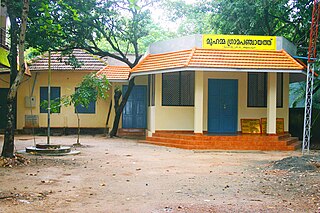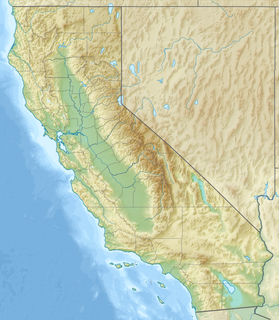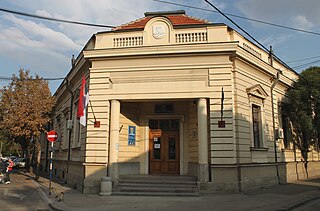
Mother India is a 1957 Indian epic drama film, directed by Mehboob Khan and starring Nargis, Sunil Dutt, Rajendra Kumar, and Raaj Kumar. A remake of Khan's earlier film Aurat (1940), it is the story of a poverty-stricken village woman named Radha (Nargis), who in the absence of her husband, struggles to raise her sons and survive against a cunning money-lender amidst many troubles. Despite her hardships, she sets a goddess-like moral example of an ideal Indian woman.

Robert Thomas Christgau is an American essayist and music journalist. One of the earliest professional rock critics, he spent 37 years as the chief music critic and senior editor for The Village Voice, during which time he created and oversaw the annual Pazz & Jop poll. He has also covered popular music for Esquire, Creem, Newsday, Playboy, Rolling Stone, Billboard, NPR, Blender, and MSN Music, and was a visiting arts teacher at New York University.

A model village is a type of mostly self-contained community, built from the late 18th century onwards by landowners and industrialists to house their workers. Although the villages are located close to the workplace, they are generally physically separated from them and often consist of relatively high quality housing, with integrated community amenities and attractive physical environments. "Model" is used in the sense of an ideal to which other developments could aspire.

Village Roadshow Pictures is an Australian-American co-producer and co-financier of major Hollywood motion pictures, established in 1986. It has produced over 85 films since its establishment in 1986 including, as co-productions with Warner Bros., The Matrix trilogy, the Sherlock Holmes series, the Happy Feet series, the Ocean’s series, and The Lego Movie. The films in the Village Roadshow library have achieved 24 number one U.S. box office openings and received 37 Academy Award nominations, 17 Academy Awards and four Golden Globe Awards.

Pazz & Jop is an annual poll of musical releases compiled by American newspaper The Village Voice, publishing lists of the year's top releases for 1971 and each year between 1974 and 2017. The polls are tabulated from the submitted year-end top 10 lists of hundreds of music critics. It was named in acknowledgement of the defunct magazine Jazz & Pop, and adopted the ratings system used in that publication's annual critics poll.
A gram panchayat is the only grassroots-level of panchayati raj formalised local self-governance system in India at the village or small-town level, and has a sarpanch as its elected head.

Baghrān is the northernmost district in Helmand Province, Afghanistan. Its population, which is 99% Pashtun and 1% Hazara, was estimated at 82,018 in 2002. The district centre is the village of Baghran; there are around 450 villages in the district.
The administrative divisions of India are subnational administrative units of India; they compose a nested hierarchy of country subdivisions. Indian states and territories frequently use different local titles for the same level of subdivision.

In India, the Panchayati Raj generally refers to the system of local self-government in India introduced by a constitutional amendment in 1992, although it is based upon the traditional panchayat system of the Indian subcontinent. This Panchayati Raj system was formalized in 1992, following a study conducted by a number of Indian committees on various ways of implementing more decentralized administration. The modern Panchayati Raj and its Gram Panchayats are not to be confused with the extra-constitutional Khap Panchayats found in northern India.

Darai Nur is a district in the north of Nangarhar Province, Afghanistan. Its population was estimated at 120,000 in 2002, of whom 28,000 were children under 12. The dominant language in the district is Pashayi and Pashto.
In the United States, the meaning of "village" varies by geographic area and legal jurisdiction. In many areas, "village" is a term, sometimes informal, for a type of administrative division at the local government level. Since the Tenth Amendment to the United States Constitution prohibits the federal government from legislating on local government, the states are free to have political subdivisions called "villages" or not to and to define the word in many ways. Typically, a village is a type of municipality, although it can also be a special district or an unincorporated area. It may or may not be recognized for governmental purposes.

Ditrău is a commune in Harghita County, Romania. It is composed of three villages:

Antichan-de-Frontignes is a commune in the Haute-Garonne department in the Occitanie region of south-western France.

Caspar Headlands State Beach is a protected beach in the state park system of California, USA. It is located in Northern California in Mendocino County near the village of Caspar. The 75-acre (30 ha) park was established in 1972.

N'Guelbély is a village and rural commune in Niger.
Zauzou is a Loloish language of Tu'e District 兔峨地区, Lanping County, Yunnan, China. It is most closely related to Nusu.
Kucong, or Lahlu, is a Loloish language of Yunnan and Vietnam. In Vietnam, the speakers' autonym is, and are also known as the La Hủ Na 'Black Lahu'. It is very closely related to Lahu.

Chautala is a village in Dabwali Mandal, Sirsa district in Haryana. Former Haryana chief minister Devi Lal and Om Prakash Chautala comes from this village, where his ancestors settled in 1919.















